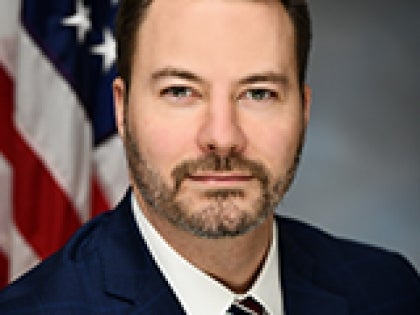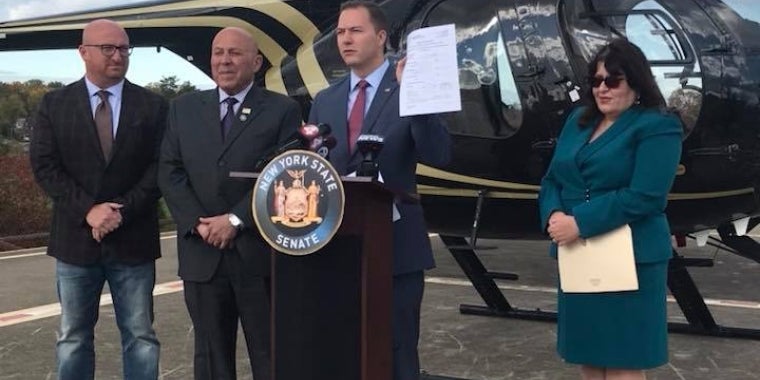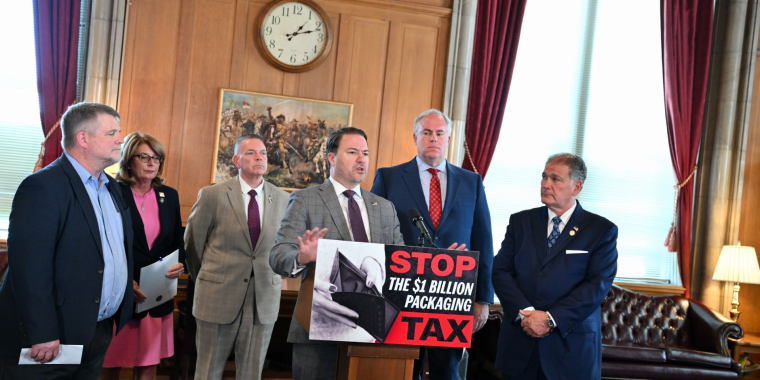
Ortt, Morinello Call on Water Board to Apply for Funds
Robert G. Ortt
October 27, 2017

Niagara Falls – State Senator Rob Ortt (R,C,I - North Tonawanda) today joined Assemblyman Angelo Morinello (R,C,I,Ref - Niagara Falls) and local business owners to call on the Niagara Falls Water Board to apply for critical infrastructure grants. Ortt and Morinello secured $2.5 billion in the 2017-18 State Budget for water quality issues and infrastructure – the single largest investment in clean water in the state’s history.
State Senator Rob Ortt said: “Niagara Falls residents and business owners deserve better than a weak ‘our hands are tied’ excuse from the Water Board. After illegal discharges and devastating overflows, the Water Board is claiming its hands are tied and it needs more money. I have a hard time believing that any amount of money could have prevented what investigators of the July 29 black water discharge called “human error.” But it funds are the issue, I’d encourage the water board to reach out to my office, which they have yet to do. While I can’t fill out the application for them, I’d be more than happy to guide them in an attempt to access the billions we set aside for water infrastructure improvements across the state.”
Assemblyman Angelo Morinello said: ““It is important for the residents of Niagara Falls to know their leaders at the state level of government understand the need for water infrastructure improvements, and that is why we fought so hard to secure a record $2.5 billion for water infrastructure improvements funding in this year’s budget. Now, the responsibility of asking for these funds lies solely with the Niagara Falls Water Board. We are a city largely dependent upon tourism generated by the Falls. Each day the Water Board waits to do its job, it is doing a disservice to the residents and businesses in Niagara Falls.”
Standing with Rainbow Air Helicopters - who noticed and photographed the July 29 discharge - as the backdrop, several local business owners pointed to the devastating effect that recent discharges have had on the city’s reputation and critical tourism industry.
Rainbow Air Helicopter Tours Manager Pat Proctor said: “The lifeblood of this city, for taxpayers and businesses alike – is our Niagara Falls and our Niagara River. Whether its the tourists who travel from around the world to see this natural wonder or the residents who call the Falls their home, people expect and deserve a basic level of government services – chief among them is the ability to provide clean, safe water.”
Niagara Falls Water Board Member Colleen Larkin said: “I truly appreciate the Senator’s concern and support in this endeavor, helping to identify the options we need such as this grant. We need to turn over every funding stone as our team continues to closely review and prioritize our needs. Securing funding like this, that is available for this issue specifically, is something I will continue to address for in my capacity. It’s no secret that our infrastructure is aging. The dynamics that came into play at the time this facility was built, such as a heavy industrial and chemical base, have changed as well. We need to look to the future and how we can not only make short term changes that can mitigate current concerns, but how we can incorporate greener technologies that are more efficient, better for the environment, and more key, help us to maintain our waterways and our crown jewel of New York State, our majestic cataracts. I can only speak as one board member, but this isn’t the time for partisan politics. It’s time for us to be solution-oriented and impactful. I believe that by working in cooperation with all parties, we can all find the right answers so that rather than be in the news for the wrong reasons, we can be the benchmark standard by which other facilities can follow.”
The press conference follows the July 29 black water discharge that New York State Department of Environmental Conservation (DEC) officials ruled to have been caused by “human error.” In addition, discharges occurred throughout the summer and fall. The water board considered these routine and attributed them to weather that exceeded the water treatment plant’s capacity.
Ortt and Morinello expressed their past and ongoing commitment to address water quality issues and infrastructure needs across the state. The final budget included:
- $1 billion for a new Water Infrastructure Improvement Act of 2017 to fund municipal water infrastructure projects over the next five years;
- $245 million for the Water Quality Improvement Program grants;
- $150 million for a new intermunicipal water infrastructure grant program to help fund projects that serve multiple municipalities and promote cost savings;
- $100 million in new funding for municipal water quality projects that would not currently qualify for existing state grants;
- $75 million for a new state rebate program to incentivize the replacement of failing septic systems and cesspools;
- $20 million for the replacement of lead pipes, with preferences given to communities with a high percentage of elevated childhood lead blood levels;
- $100 million over five years for the state Superfund program to be used for clean water projects; and $30 million over five years for solid waste and drinking water mitigation and remediation projects;
- $10 million for a new emergency infrastructure loan program to repair breaches of infrastructure that causes an imminent threat to the public health or the environment; and
- Funding for new measures to control point-source pollution, protect water sources, promote green infrastructure, address water contamination, and improve data collection to better track water quality information; and
- $275 million in continued funding for Clean Water.
Share this Article or Press Release
Newsroom
Go to Newsroom

